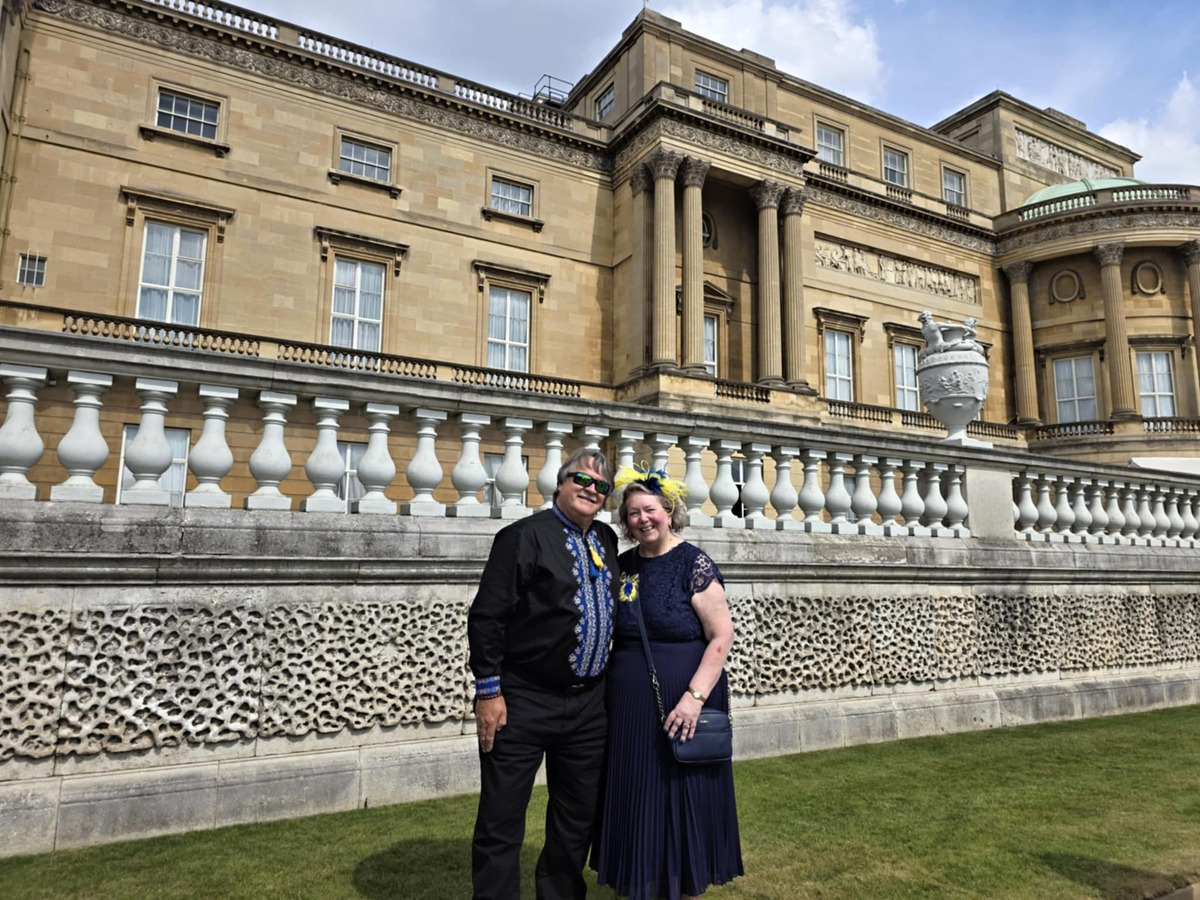Last month, my younger sister, Jaroslawa Nahaylo-Madylus, who was born and lives in the British Midlands, was honored for her many years of volunteer fundraising and organizing assistance for the victims of war and other misfortunes in Ukraine.
She and her husband, Ihor Madylus, were invited to a garden party at Buckingham Palace by the British royal family on May 20. In Ukraine, she has also recently been awarded medals by Ukrainian organizations for her tireless volunteer work.
I’m happy to note that she is one of the many kind-hearted and motivated people around the world, of Ukrainian descent or not, who have been helping Ukraine and the Ukrainian people during this grim time of Russia’s barbaric aggression, by all means available to them. So, in putting the spotlight on her, in effect as an exemplary case study, I am acknowledging the tremendous importance of this support.
Like me, Jaroslawa – Slava, or simply Jary, as her English friends call her – grew up in Wolverhampton, in England’s West Midlands, near Birmingham.
It was there that we responded to the challenge of a hybrid existence. On the one hand, it entailed growing up and being educated in Britain, that is, full immersion and participation in the English way of life, culture, and values. And, on the other, being raised by Ukrainian parents within a vibrant Ukrainian refugee community.
Despite its small size, it had its own intense weekend agenda: Saturday school in Ukrainian, a community center and church, and an engrossing Ukrainian cultural and political life.
Under the influence of our parents and the Ukrainian community, both of us were shaped to become British Ukrainians. There was loyalty to democratic Britain and a sense of pride in being British citizens and being accepted as such. But in our hearts, we knew that we were the children of those who had been forced to leave their homes in Ukraine because of Russian communist oppression.
Even though the prospect of Ukraine becoming free one day seemed so unlikely during the ’60s, ’70s, and into the ’80s – when the seemingly all-powerful totalitarian Soviet Union existed – we, like countless hundreds of thousands in the vast Ukrainian political diaspora scattered from Canada, the US, and Latin America through Europe to Australia, kept hope, our cultural identity, and political aspirations alive.
At the age of 18, I left Wolverhampton for university and a career that has taken me to many parts of the world and to responsibilities I could never have imagined.
Years later, Slava was also accepted to study at London University’s famed School of Slavonic and East European Studies. But she decided not to go, for she had fallen in love with a long-haired, handsome Ukrainian boy from Bedford, Ihor, who drove a motorbike. They’ve been happily married ever since and together have worked hard to help the Ukrainian cause.
Initially, they became involved in helping the victims of the 1986 Chornobyl nuclear power plant disaster.
After Ukraine achieved its independence in 1991, they became frequent visitors to the land of our parents and immersed themselves in its cultural and social life. Lviv was their adopted base.
When Russia launched its de facto war against Ukraine in 2014, seizing Crimea and part of eastern Ukraine’s Donbas, Slava and Ihor rose to the challenge and began organizing help from Britain for the victims, particularly the widows and orphans of the fallen heroic defenders. They were supported by others in Britain, most notably Ukrainian women’s organizations and the local Rotary Club.
In 2016, Slava and her UK friends, together with the widow of a Ukrainian war hero, Olena, based in Lviv, created an NGO called “Sumna Kvitka” (Sad Flower) to promote this work. It included delivering material help, organizing cultural events and summer camps for orphaned children, and providing aid to those at the front.
They have been very creative in their approach and have enjoyed the support not only of many of their Ukrainian friends, but also of local Brits. For example, Support Ukraine UK Appeal Charity, which Slava co-founded with Tania Robinson, another tireless British supporter of Ukraine, has sent over 1,000 boxes of aid to the front line and army hospitals. And Ihor has even organized contests for local fishermen ready to help the needy cause.
Despite having to combat a very serious illness during the last few years and not being able to travel to and from Ukraine, Slava has bravely kept up her charitable work.
Recently, she and her husband were invited to a royal garden party, where she met with others being honored by the British monarch. In 2025 – and again this year – Slava’s commitment and efforts were also recognized in Ukraine by organizations acknowledging the contributions being made by volunteers.
Slava, as I’ve mentioned, is by no means unique in doing so much to help Ukraine and Ukrainians in their time of need. Fortunately, there are countless such examples within the Ukrainian diaspora, among benevolent supporters of Ukraine, and within Ukraine itself.
Weapons, financial and political support, are vital for Ukraine. But addressing the human factor at a grassroots level is equally important.
I’m proud of my sister, her husband, and their friends in the UK who have done so much voluntarily and selflessly for a noble cause. I’m sure our parents, if they were still with us, would feel the same – content that their love and patriotic legacy have been put to such use during a new and very challenging period in Ukraine’s and Europe’s history.
And the rewarding factor is that the UK itself has become such a staunch supporter of Ukraine and an immense source of pride for those of us who are British citizens of Ukrainian descent.
